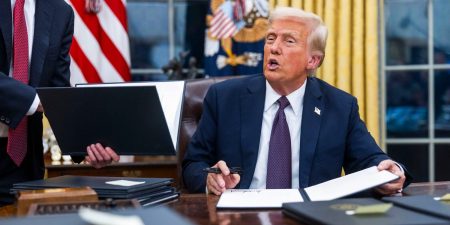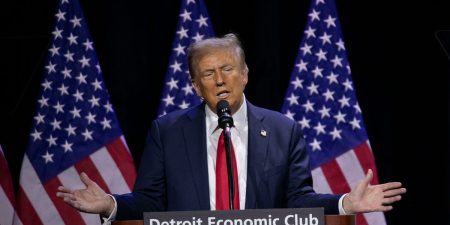The Impact of Trump’s Tariffs on US Shoppers: A Growing Burden on Consumers
Introduction: Understanding the Tariff Changes and Their Effects
The implementation of President Donald Trump’s new tariffs on imported goods from China, Canada, and Mexico has sparked significant concern among U.S. shoppers. Initially, the tariffs were set to end the "de minimis exemption," a rule that allowed importers to avoid paying duty and tax on shipments valued under $800. This exemption, often utilized by Chinese e-commerce giants like Shein and Temu, has been a crucial factor in keeping costs low for consumers. However, the situation took a dramatic turn when Trump signed an executive order to pause the removal of the de minimis exemption, offering temporary relief to both businesses and shoppers. Despite this pause, many U.S. consumers have already felt the pinch of additional shipping-related fees, leading to frustration and a reevaluation of their shopping habits.
The Pause on De Minimis Exemption: A Temporary Reprieve for Shoppers
In a surprising move, President Trump issued a follow-up executive order on Friday, temporarily halting the end of the de minimis exemption. This decision came after widespread backlash from consumers and businesses alike, who argued that the removal of the exemption would lead to increased costs for everyday shoppers. The de minimis exemption, also known as Section 321, has long been a lifeline for smaller importers and e-commerce platforms, allowing them to avoid costly tariffs on low-value shipments. While the pause offers a temporary reprieve, the uncertainty surrounding the future of the exemption has left many shoppers and businesses on edge, unsure of what to expect in the coming months.
Shoppers Face Additional Fees: Real-Life Examples of the Tariff Impact
As the tariffs began to take effect, many U.S. shoppers reported receiving unexpected messages from companies and shipping firms, requesting additional payments to receive their packages. Among those affected were influencers and everyday consumers who shared their experiences on social media, highlighting the financial burden these fees have imposed. Melissa Covarrubias, a San Diego-based influencer, reported paying over $100 in additional fees for an order shipped through DHL. She expressed her frustration, stating that the added costs felt like "another way to squeeze more money from everyday consumers." Similarly, Cristina Adams, a beauty and lifestyle influencer, shared her experience of being charged an extra $18.82 in duty fees for a pair of frames she ordered from Lensmart. Both women emphasized that while they paid the fees to receive their packages, the additional costs have made them more cautious about where they shop in the future.
Consumer Reactions: A Shift in Shopping Habits and Perceptions
The imposition of these additional fees has led to a significant shift in consumer behavior, with many shoppers opting to be more mindful of where they purchase their goods. Covarrubias, for instance, has decided to cancel her Amazon account and focus on shopping at local stores, even if it means paying higher prices. "Malls and local stores often carry the same items at higher prices, and I’d rather not pay a premium for something I can get elsewhere for less," she explained. This sentiment reflects a broader trend among consumers who are increasingly aware of the hidden costs associated with international shipping and are seeking ways to minimize their expenses. For many, the frustration lies not only in the additional fees but also in the perception that they are being unfairly targeted by policies that seem designed to benefit corporations rather than consumers.
The Role of Companies in Navigating the Tariff Landscape
While consumers bear the brunt of the additional fees, companies are also feeling the pressure to adapt to the changing tariff landscape. Crop Shop Boutique (CSB), an Australian-based athleisure brand with suppliers in China and Turkey, has tried to mitigate the impact of the tariffs by offering customers partial reimbursement of the duty fees. Covarrubias, who ordered from CSB, noted that the company offered to cover 50% of the tariffs or provide a gift card for the same amount. However, the complexity of the situation is evident in the fact that CSB’s shipments originate from a warehouse in Queensland, Australia, which may have contributed to the confusion surrounding the tariffs. Despite these efforts, the financial burden on consumers remains a significant concern, and many are left wondering if such gestures are enough to offset the inconvenience.
Conclusion: The Uncertain Future of International Shopping
The situation surrounding Trump’s tariffs and the de minimis exemption remains fluid, leaving both consumers and businesses in a state of uncertainty. While the temporary pause on the removal of the exemption has provided some relief, the long-term implications of these policy changes are still unclear. For shoppers like Covarrubias and Adams, the experience has served as a wake-up call, prompting them to rethink their shopping habits and seek alternative options that avoid the pitfalls of international shipping. As the trade landscape continues to evolve, one thing is certain: the average consumer will remain at the mercy of policies that often feel far removed from their everyday concerns. Whether through increased transparency, better communication, or more consumer-friendly policies, businesses will need to navigate this challenging environment carefully to maintain the trust and loyalty of their customers.












